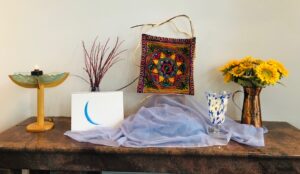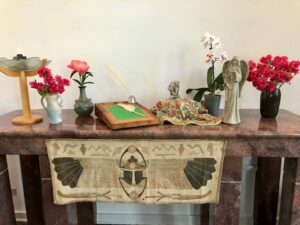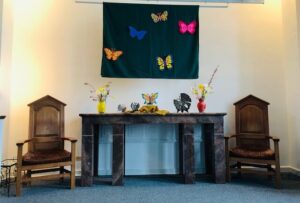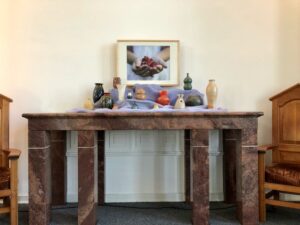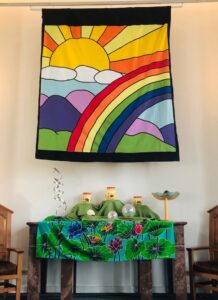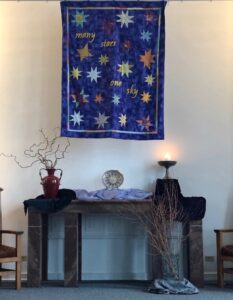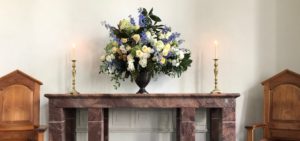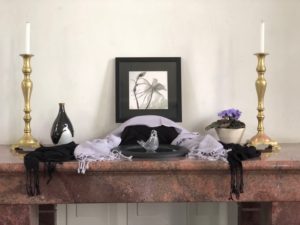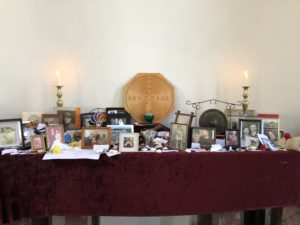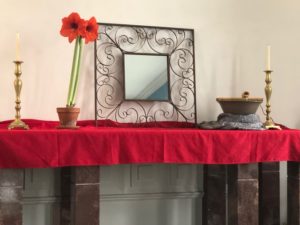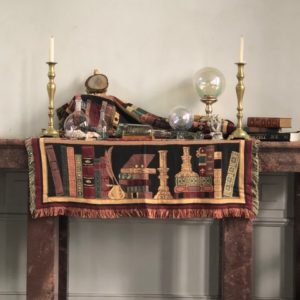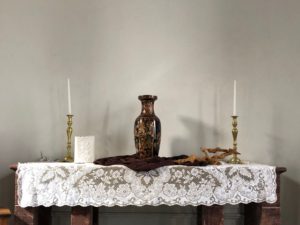I find it very good news that Love Knocks and Waits for Us to Hear. We need that at times like this.
Here we are, on the morning of August 12, 2018.
We look back.
We pause for a moment here.
We go forward.
We humans, throughout history, have needed Love again and again when our hearts are breaking, when harm threatens us, when the way forward is not clear, when we feel helpless. Humans faced such situations in the earliest of times, as we hear in the myths of ancient Greece, the parables from China, the stories of Native Americans, and many other tales. We know about tragedies from news reports and history books in recent centuries. I, myself, this week, turned to fellow congregations who have lived through crisis, to see how they navigated the anniversary of a public trauma. As just a few examples, Knoxville endured a shooting ten years ago, Santa Barbara endured wildfires last year, and Baton Rouge endured a complex summer two years ago. Hearing their story helps me reflect on our story. And I hope it helps you, too.
Rev. Nathan Ryan reports:
“In the summer of 2016, in Baton Rouge, Baton Rouge experienced three distinct and muddled together traumas. The first was the police shooting death of Alton Sterling on July 5th and the militarized police response to the protests. The second was the killing of three law enforcement officers on July 17th. The third was major flooding such that 60 members of the congregation had water in their homes, and many became temporarily homeless.
At the end of the summer, Baton Rouge Unitarian Universalists were battered and bruised, they questioned their city, their police, their infrastructure. Some questioned their faith and their god.” Doesn’t this sound familiar? And yet, two years later, it was observed… “One of the things you need to know about the people of Louisiana, they are so resilient, they are sick and tired of being called resilient.”
One of the things that has helped them heal is story-telling: putting a timeline on facebook, journaling about emotions, making art together, compiling photo essays, and saving children’s art. All of these were put into a book that demonstrate the challenges the congregation faced and how they lived through that chapter. That book has been circulated to seminaries and to other congregations experiencing trauma.
Looking back, one of the ministers there asked the congregation to give a name to that chapter in their lives, and people gave many suggestions; here are some examples of how they named it:
Summer from Hell
Deluge and Despair
Summer of 350,000 Lamentations
The Summer that tore us apart and Brought us Together
The Summer when Mother Nature and Father Justice collided with ignorance and delusion in Baton Rouge
Well, now, here, in our town, we refer to the events last year as “August 12.” In other parts of the country and world, they call it … “Charlottesville.” Perhaps you have another name for it? Naming is important. Story-telling helps heal.
In order to make space for you to tell your story, some of the Pastoral Visitors Team at the UU church in Richmond have come over here today. (Ask them to raise hands.) They will be here all afternoon so you can come and talk to someone who didn’t live through this in our town. They are prepared just to listen.
Rev. Nathan Ryan also shared this story: “In Oklahoma City in 1994 there was a bombing and First Unitarian Church was close enough to the federal building to have some of its windows blown out. Following the immediate aftermath came a second wave of trauma. Trauma and grief don’t just go away. They come and go in waves. The church responded to this second wave by handing out buttons. They had two kinds. One said, “Tell Me Your Story” and the other said “Listen to My Story.”
Now, here in Charlottesville, this past year has been haunted by memories, flashbacks, news reports. This is not unlike someone who has lost a loved one. Sometimes I give a pamphlet to families after a death. It is called: “What to expect in the first year of grief.” I kind of wish someone had given me a pamphlet like that last year. It is true that various social service groups tried to help people deal with the trauma, but still, many of us have had symptoms and struggled to see our way through. That’s the thing about social services…if a person is so paralyzed or shut down by trauma, then even the best services might not reach them.
And, yet, this is not like the death of a loved one, because it is not final. We have spent the year wondering if these folks will come back.
Nonetheless, the metaphor is helpful. Just as in the loss of a loved one, people might grieve how they handled the death…they didn’t visit enough, they didn’t say goodbye or I love you when they had the chance, that they didn’t advocate to the doctors in a certain way, or whatever regrets they carry.
Similarly, in this town, who among us has not looked back and wondered if they could have done something differently last year?
And yet, with any regret, we need to try to use the remorse to help us find new behaviors going forward. We need to forgive ourselves for what we didn’t do, or what we did, and then act going forward.
If you felt helpless, I ask you now: what have you learned about power, or acceptance?
If you felt disillusioned that the police were not trustworthy, I ask you now: how can you build community security?
If you felt let down by friends that you thought would come through for justice, I ask you now: how can you understand and move on?
All of those involve grief and loss. All of them are real, and that means we need to accept the reality of the situation, even if we don’t approve. Having accepted reality, we are more able to go forward, living, with love.
And so, now, here we are, on the morning of August 12, 2018.
We look back.
We pause for a moment here.
We go forward.
But the past year has not just been about what has happened on August 12 . Life goes on, with its winding river, just like it has for all of human history. In the past year, right here, among all of us:
A school year began, and ended.
Jobs were found, and lost.
Marriages have been formed, and dissolved.
Babies have been born, and not born.
Illnesses have been diagnosed.
Aging bodies continue to age.
And around the world, there have been moments of international joy and healing, as well as international despair and devastation.
This is what humans have lived with throughout time. People have found so many ways to live their daily lives even as tragedy occurs. Here is a story from the Fellowship of Reconciliation magazine, in 1999, by the editor, Richard Deats.
“In May 1992, during the siege of Sarajevo, a mortar shell exploded at 4 pm outside a bakery in the city where a long line of people were waiting to buy bread. Twenty-two people were killed and hundreds more wounded. But, despite the danger, the next day hungry people once again lined up. Yet, this day was different, for at 4 PM, a man appeared and began playing the cello. He played a mournful, sad song called Adagio, by Tomaso Albinoni. For the next twenty-one days, he came to the street in front of the bakery and played the music.”
There have been beautiful, artful actions like this all over the world, and in our town here. You know them. You have seen them. Some of you created them. They give hope. They do not fix everything. But they touch the human heart.
So, life goes on, with its winding river. In this life, we need to figure out how to bless the things that have gone before. How to take the lessons, let go of what no longer serves us, and release.
Sometimes that release is a quick and easy mysterious grace, and sometimes that release is long hard work.
Over the last year, some of the people who were injured on August 12 have literally had to learn to walk again. This took work and patience. Physical therapy is not easy. And, yet, with time, with the help of doctors, nurses, aides, and physical therapists, some healing has occurred. The tissues of the body are programmed to mend and survive. That is a metaphor. Whether the injury you sustained last year is emotional, physical, or spiritual, healing is within our control to some degree: it takes discipline, and it takes help from others, and it takes grace.
And so, now, here we are, on the morning of August 12, 2018.
We look back.
We pause for a moment here.
We go forward.
Each of us had to choose, in our own way, how we would face this particular weekend of events—yesterday and today.
One message we receive again and again is that silence is complicit.
I also have heard debate about whether to “stay safe” as the highest priority.
Meanwhile, I heard some people be grateful for the police presence, while others express anger and fear about the police.
So, I invite us to look at these not as strict guidelines, but to examine the nuances.
Silence has various forms and motives. Action has various forms and motives.
On Friday I spoke with a man who told me his goal for the weekend was to avoid confrontation. I got the feeling his particular life depended on it. If he needed to stay silent to stay alive, that is his unique choice to make.
How much do we need to speak in order to not be complicit? And how much do we need to speak to make a difference?
How safe do we need to be, and how much can we act?
All of these exist on a spectrum, and in unique contexts, and in personal lives.
One person’s priorities are not another person’s priorities. Let’s get curious about that. In the social hall after the service, try asking someone—what were their priorities this weekend?
The good news is: as we stay in dialogue with each other, as we listen to our neighbors, we learn more and more about what safety and risk means to each person, and about what silence and speaking up means in each situation.
Remember I told you about Baton Rouge earlier? A woman there named Janina Fuller says this:.
“If I can offer one small bit of wisdom from this experience here it is: meet your neighbors. Get to know the people who work in the stores where you shop. Make time to learn something about your children’s teachers, the people who groom your pets or your yard, or your hair. When the next hurricane comes [or earthquake, flood, tornado, rock slide, fire, dust storm or tsunami] you may need them to save your life, or you might have to save theirs. Get to know them, especially the ones you don’t like or don’t agree with. They are all you and me. There is no they. There is only we.”
And, I ask myself the question I am always asking: What is the role of the sacred here? How can we know if we are living at our spiritual best? A theologian named Teresa of Avila in the 1500s reflected this way: “Love your neighbor. You cannot really know whether you love God. But you can have some idea whether or not you love your neighbor.”
Loving your neighbor is not sentimental. It is justice-making work, looking at why some people are afraid of police and some are not, why some people have access to housing and some do not, why it is easier to look the other way. Action for creating safety for each person makes a difference in concrete bricks, mortar, and policy.
The Rev. Steve Crump, in Baton Rouge, wrote in a letter to the editor: “For my part, appeals to “Unite. Come together. Let there be peace on earth,” ring hollow just now, even as I teach and preach non-violence, even as I love to sing, “Let There Be Peace on Earth.” Let there be peace. Yes. But not without justice.
We tragedy-observers are actors also and, therefore, must take an active role in bringing credible and transparent law enforcement reform to this parish and region. The nation is watching. Act well our parts. Mourn our dead. But let us not equivocate on issues of justice, truth-telling, and reform because not one of us is exonerated.”
My friends, all over this globe, people are facing hunger, deportation, addiction, homelessness, lack of health care, and many other pressures that keep them from thriving as members of the human family. A web of greed presses down, but that web can slowly be dismantled by small, intentional acts, and by great acts of truth-telling. Pick your tool, if you have not already. And continue your work, side-by-side. And, sing some work songs while you are at it.
Blessed be. Amen.
Rev. Alex McGee

